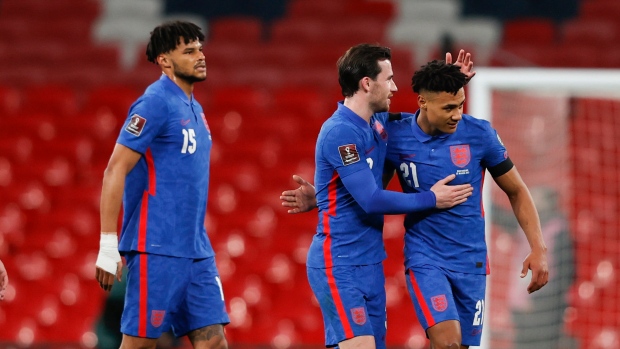Jun 9, 2021
Can England meet the hype?
One of the deepest and most dangerous teams at Euro 2020, can Gareth Southgate's England possibly handle the hype?
ESPN

England's biggest challenge this summer might be how they cope with hope turning into expectation.
Manager Gareth Southgate took charge five years ago with the national team in a desperate state, humiliated by Iceland at Euro 2016 and forced to part with Roy Hodgson's replacement after that tournament, Sam Allardyce, just one game into his tenure amid a newspaper sting. Consequently, little was expected from England at the 2018 World Cup, but Southgate encouraged his squad to unburden themselves from historic failure and revel in the moment. They even broke the curse of the dreaded penalty shootout, beating Colombia on spot-kicks in the round of 16 -- their first win by that method in a World Cup match.
Three years on, many of England's younger players at that tournament have developed further and are now supplemented by exciting talent of an even more tender age.
England have one of the youngest squads here, and 15 of the 26-man squad have no senior tournament experience. The selections of Jude Bellingham and Bukayo Saka, 17 and 19 years old respectively, epitomize Southgate's commitment to youth over experience, but more is demanded of the group now. This summer is the closest thing England have experienced to a home tournament for 25 years dating back to Euro '96, when a nation was whipped into a frenzy by England's run to the semifinals. Southgate will be able to strategize and train at England's usual home of St George's Park, a facility where they have a full-size pitch re-created to the exact specifications of Wembley. That will come in handy, because all three of England's group games are there. In fact, should England win Group D, they would play every game all the way through to the final, bar one, at Wembley.
Yet preparations have not been ideal. Injuries to key players, including Manchester United defender Harry Maguire and Liverpool midfielder Jordan Henderson, have created uncertainty over Southgate's starting XI for the opening game against Croatia. Liverpool full-back Trent Alexander-Arnold was forced to pull out through injury on Thursday, while Jack Grealish is managing a shin problem and Leeds midfielder Kalvin Phillips has been hampered by a shoulder issue.
There are questions marks about England defensively -- particularly against the top sides -- but they possess an exciting array of attacking talent that could cause problems for any team. In addition to Tottenham striker Harry Kane, who won the Golden Boot as top scorer at the last World Cup, Southgate has an embarrassment of riches, with Manchester City duo Phil Foden and Raheem Sterling, Manchester United's Marcus Rashford and Borussia Dortmund's Jadon Sancho among those vying for inclusion.
Perhaps the key point is this: England reached the semifinals at Russia 2018 with a significant reliance on set-pieces and an acute understanding of VAR. Only three goals came from open play, while their nine from set-pieces was the highest at a World Cup since records began in 1966. England have to be better in possession -- a perennial tournament failing -- and carry more of a consistent threat, all while making sure they tighten up defensively. It does feel as though Southgate has more options this time and his tactical choices will therefore be vital, deciding whether to play with a back three as in Russia or a 4-3-3, 4-2-3-1 shape.
This is still a young squad, but England have come through a lengthy rebuild. The next phase starts now.
